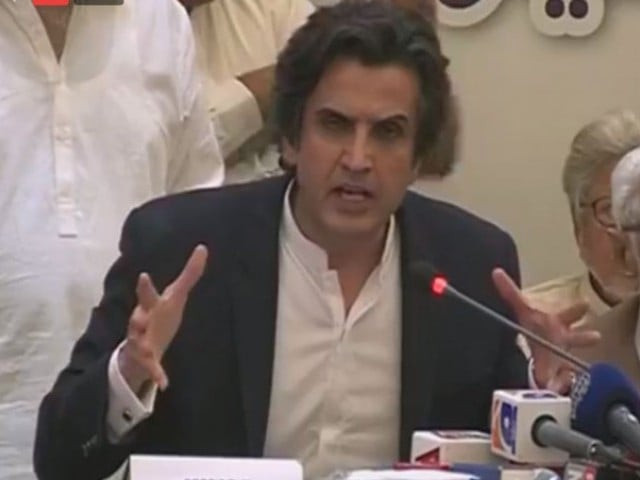Planning Commission’s 5-year plans lack solutions to structural problems
Planning ministry incapable of independently performing monitoring, evaluation and audit functions

Minister for Planning, Development and Reforms Makhdoom Khusro Bakhtiar.
The turf war over the past few months has resulted in removal of at least two section chiefs including that of the Public Investment Programming (PIP). However, this political jockeying is nothing new as the ministry has been instrumental in diverting billions of rupees worth of funds illegally from the PSDP to pet projects of parliamentarians.
From People’s Works Programme in the past to the more recent Sustainable Development Goals (SDGs) achievement fund, these projects have been used by governments for political meddling while staying under the radar.
As recently as early 2018, billions of rupees were diverted from parliament-approved PSDP projects to help raise party funds by awarding contracts to special interest groups.
However, this is easier said than done as it requires extensive lobbying with members of the National Assembly Standing Committee on Planning as well as with factions of bureaucracy within planning and finance ministries.
A few contractual posts related to the development budget advisory function were cleverly engineered to empower political appointees with vast financial and administrative powers.
Since 2008, a parallel structure has been installed in collusion with a few former bureaucrats working as advisers and the system still acts as a backstop for political patronage. This systemic political corruption or ‘state capture’ has led to monopolisation of the government by actors belonging to the powerful elite over the last decade.
This is quite unfortunate as after the 18th Constitution Amendment, Pakistan should have moved far from its Soviet-inspired command-economy roots. Since 2008, the ability of technocrats to control public sector has shrunk as the 18th amendment has weakened the federal government while provinces enjoy more autonomy under the sway of their party agendas.
Super ministry
But Pakistan’s Planning Commission – the so called ‘super’ ministry – is the white elephant in the room that is not ready to embrace devolution in letter and spirit. The ministry still directly impacts federal-provincial relations due to its influence in the distribution of funds. Not only that the planning process remains fragmented at best, but its five-year plans are more of a rhetorical agenda rather than proposing solutions to significant structural problems.
Offices of its technocrats (members) have become a factory of policy memos that could be found cluttering the back burners of secretary office. What we don’t find there is a candid dialogue process, effective oversight over mega projects and availability of reliable data related to poverty or sector growth.
Billions of rupees have been earmarked by the planning ministry for scholarship funds whereas education is a subject of the Higher Education Commission and the Ministry of Education.
Instead of performing a conducive and facilitating role, it has been engaged in the duplication of work and undue interference whereas the Planning Commission was expected to prepare holistic policy blueprints for long-term education planning. The commission claims credit for billions of dollars worth of infrastructure projects but when it comes to preparing an integrated national transport policy, it has never reached consensus with other stakeholders.
Planning challenges of the federation are very real. Policymakers need to think afresh and recast a new role for the ministry. The government needs to roll its sleeves up and get down fixing archaic and expensive planning rules.
The government needs to scrap bizarre loopholes in its planning process and ask questions what difference has the Planning Commission actually made? And more importantly, has it learnt any lessons over the past 66 years?
The planning ministry, with its mandate to be an official think tank, has serious internal governance and capacity problems. It is incapable of independently performing monitoring, evaluation and audit functions related to mega projects and relies solely on reports furnished by executing agencies.
At the policy level, we need to devolve planning and fiscal powers to local government bodies as it will help lead the development process organically through grass-roots level political system – leaving the need for creative engineering to transfer development funds redundant.
The writer is a Cambridge graduate and is working as a strategy consultant
Published in The Express Tribune, September 24th, 2018.
Like Business on Facebook, follow @TribuneBiz on Twitter to stay informed and join in the conversation.


















COMMENTS
Comments are moderated and generally will be posted if they are on-topic and not abusive.
For more information, please see our Comments FAQ